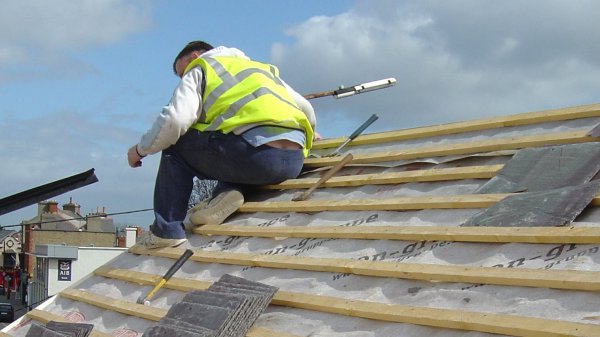The Black Economy is costing jobs and increasing unemployment.
It is becoming increasingly difficult for tax compliant companies in the construction industry to survive today because of the Black Economy. We must face the reality that during the past 5 years sales of roofing materials have dropped by more than 70% in value, employment has dropped by more than 50% but many overheads have dropped by less than 15% and indeed many have increased. Examples are diesel, insurance, road tax, rents, rates.
A significant amount of Irish salvaged building materials are acquired and sold by part-time operators or through the “Black Economy” for cash. The result is tax fraud ( No VAT, no PAYE, No PRSI, No USC,) no Health & Safety for employees, No rates, No site insurance ( Public and Employers Liability ) etc. Lack of Planning restrictions can lead uncontrolled demolition with serious damage to very important Heritage buildings. Theft of lead has become a serious problem and a serious expense to the property owner. When a guy drives into our Depot with 36″ Bangors in the back of a breadvan offering them for sale, we refuse to buy. We immediately phone the OPW to check the roofs on their heritage buildings. We have phonecalls like ” We are from County Meath and we are stripping an old building over the weekend with Killaloe slates in Tipperary. Will you buy them from us on Monday to save us the trouble bringing them all the way back to Meath ?? We say “NO WAY” !!!
Lack of regulation can lead to great difficulty for tax compliant companies to conduct legitimate salvage business. Irish and UK Building Regulations are very similar but we see a vast difference in the implementation and monitoring of the regulations in each country. Salvage Merchants in the UK are subject to tighter scrutiny and most serious operators have SALVO CODE approval. We should have a similar system in Ireland to get rid of the cowboys or at least to make it more difficult for them to operate. Having to adhere to the disciplines of the Salvo Code and be able to proove the provenance of all salvaged building materials in stock, greatly reduces the unauthorised interference with PROTECTED STRUCTURES.
Oddly enough it is the Revenue Commissioners who have the most cost-effective solution and it is their job anyway to enforce compliance. It is not rocket science !!. Just look at the Done Deal website or use GOOGLE to discover the repeat advertisers who deal in salvage building materials. Some are at it for years. It is no surprise that some are cleverly operating ” under the radar ” as far as tax in concerned. Revenue Inspectors should visit their premises and see the large stocks at hand. Check if their tax returns (Personal or Business) reflect those ASSETS ?. If not, can the client explain how the material was acquired and paid for ?.
The Revenue Authorities could easily close the tax loopholes. C2 Tax Clearance Certification should be extended to include ALL PAYMENTS in the construction industry. Materials used on restoration jobs, should be checked for tax compliant suppliers and labour providers. Main contractors on restoration projects usually require INVOICES for salvage materials being supplied. Payment by company cheque will appear on recipients bank statements. TAX @ 35% should be deducted from every payment if a TAX CLEARANCE is not provided. Revenue inspectors should visit supplier premises and satisfy themselves with adequate proof of purchase. This should greatly reduce the scope for cash transactions.
A little bit of more joined-up thinking between all Government Departments could reduce tax evasion. Why is it that the Collector General is still featuring, for significant amounts, in lists of Creditors for companies in Liquidation ?.
Duncan Stewart on the “wireless” but who, in our Government, is paying attention to what he is saying ?
I recently heard Duncan Stewart interviewed by Marian Finucane on radio and he was expounding a really sound philosophy about energy conservation. Home improvement GRANTS should be reintroduced and improved. This would kick-start construction employment. It would take construction employees off the dole. It would improve sales of building materials. It would prevent tax seepage into the Black Economy because grant payment could be tied in with tax compliant labour and tax compliant material supply. Owners of protected structures, by and large, have the savings to do the work – all they need is a small grant incentive to do it NOW rather than 5 years time when further dilapidation will have taken place. If we follow Duncan Stewarts advice there is a 5 year payback on expenditure on building insulation improvement so that is also a saving which should not be ignored.
The only area of the Construction industry showing any life in recent times is House Improvements and extensions. Contractors and suppliers are really struggling to survive. At a recent residents association AGM in our area, the MAIN topic of discussion was the introduction of the Local Property Tax and house values. People are really concerned that this tax will become aggressive and might be twice or three times todays rates within a short period of years. Many speakers said they were concerned about extending or improving their houses because it would push them up into the next tax bracket. This is a further negative impact on the construction sector that we could well do without.

